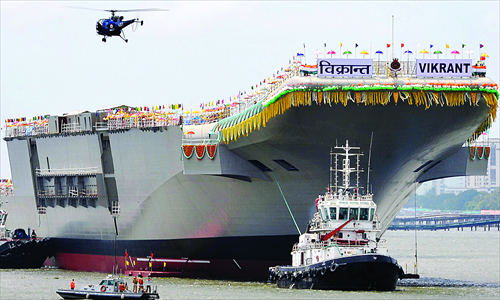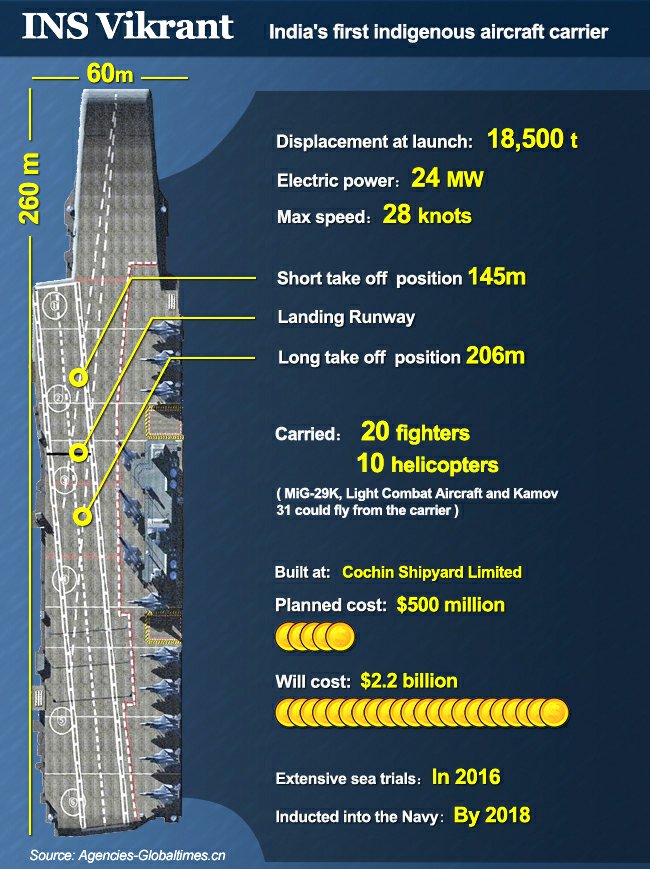India hails first indigenous aircraft carrier as milestone

A tugboat guides the indigenously built aircraft carrier INS Vikrant as it leaves the shipyard after the launch ceremony in Kochi on Monday. Photo: AFP
India launched its first indigenous aircraft carrier Monday, a significant moment that analysts said would boost India's defense capability and military power but have little influence on the military situation in Asia.
The INS Vikrant, scheduled to come into full service in 2018, is said to be the biggest warship to be built in the country. The 37,500-ton aircraft carrier is 260 meters long and 60 meters wide, with a flight deck almost twice the size of a football field.
"It's a remarkable milestone. The launch marks just the first step in a long journey. We must continue the process of developing indigenous capability to secure our maritime interests," Indian Defense Minister A.K. Antony said at the launch ceremony held in the southern city of Kochi.
The ship will be able to hit targets within 1,600 kilometers and reach a speed in excess of 28 knots.
The $5 billion project would also make India the fifth nation capable of designing and building its own aircraft carrier. Other countries includes the US, Britain, Russia and France.
The ship will be equipped with modern weapons and systems, including long-range, surface-to-air missiles and close-in weapons system.
It will be tested over the next four years.
"The unveiling of its first home-built aircraft carrier is significant. It will boost India's military power and increase its influence over the Indian Ocean," Fu Xiaoqiang, an expert on South Asian studies at the China Institutes of Contemporary International Relations, told the Global Times.
It has also demonstrated the capability of India's aircraft manufacturing industry and will also boost the national defense industry, Fu said.
Analysts said New Delhi has long sought to build carrier groups to bolster its defense capability, but it will not change the regional military balance or have much influence on the military situation in Asia.
"Without supporting missile systems, the aircraft carrier is no more than a target," Fu said.
India relies heavily on other countries for its weaponry. Statistics showed 70 percent of its weapons and military systems are imported from overseas, mainly from Russia, according to China Radio International.
"The aircraft carrier will not break the military balance in Asia, because the main interests for India lies in the Indian Ocean while China, a big power in Asia, has no conflict of interest with India in this area," Yin Zhuo, a military expert from the Chinese Navy Advisory Committee for Informatization, told the Global Times.
Indian analysts said the development of the nuclear-powered submarine by India is of much more value than the aircraft carrier.
"Compared with many aircraft carriers, India needs more submarines and missile systems, as underwater vessels and missiles would increase offensive capability much more than a carrier can," M.D. Nalapat, director and professor of the School of Geopolitics at Manipal University in India, told the Global Times.
On Saturday, India announced its first home-built nuclear submarine was ready for tests, an important step before it came into full operation. The nuclear submarine can attain a speed of 44 kilometers an hour, and can carry ballistic missiles and torpedoes.
Decision-making errors, including the policy of buying expensive and old carriers from Russia and refusing to allow the private sector to build big naval vessels, has delayed progress in defense production, Nalapat said.
The INS Vikrant is two years overdue after problems occurred in crucial equipment.
India already has one aircraft carrier in operation, but the British-built warship will be phased out in the coming years. Another warship, the INS Vikramaditya, is scheduled to be delivered by Russia later this year.
Agencies contributed to this story
Editorial:Aircraft carriers key to strategic deterrence
Read more in Daily Special: India’s INS Vikrant signals rising naval power in Asia

Graphics: Globaltimes.cn